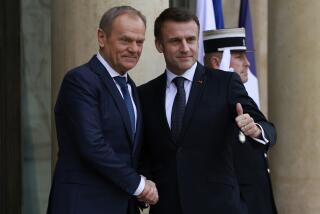Sweeping bank bailouts unite Europe
- Share via
BERLIN — Like soldiers falling into step, governments across Europe offered up a series of sweeping bailout plans for their banking systems Monday, pushing past $2 trillion the amount of taxpayer money that has been pledged to shore up the continent’s floundering financial sector.
Markets responded positively to the news, with stock exchanges gaining back some of the ground lost in last week’s selling binge. The bourses in Paris and Frankfurt, Germany, both closed up more than 11%, while London’s index climbed more than 8%.
The rescue packages announced by the leaders of Germany, France and other European nations combine massive infusions of capital with guarantees for short-term loans. The rolling wave of bailout announcements was the continent’s first coordinated response to the global financial crisis after days of squabbling and dizzying drops in global markets.
“The time of going it alone is, fortunately, over,” French President Nicolas Sarkozy declared. Though the proposed bailouts are not guaranteed success in restoring investor confidence, “the highest risk in our times would be not to dare,” Sarkozy said.
The combined rescue packages of France and Germany, continental Europe’s two largest economies, exceed $1 trillion, far more than the $700-billion package approved by the United States nearly two weeks ago.
Sarkozy said France would make as much as $490 billion in state funds available to keep the country’s banks afloat, including $54 billion for capital injections.
In Berlin, German Chancellor Angela Merkel proposed a $653-billion bailout package, the largest emergency program in Germany’s postwar history and more than 1 1/2 times the government’s entire 2008 budget. Under the plan, likely to be passed by Parliament this week, $109 billion would be earmarked for recapitalizing the banks, and the remainder would take the form of loan guarantees.
Merkel called the package the “first piece in rebuilding” the health of Germany’s financial system, which has been paralyzed by a lack of liquidity for some banks and an unwillingness by others to lend for fear of not being paid back.
“The measures we have taken have one objective: They shall help build new confidence,” Merkel said “Confidence between the banks, confidence in the economy, confidence of citizens. Confidence is the currency that is valid.”
She added that the government would not necessarily end up spending the price tag’s full amount. It was possible, she said, that not all the funds for loan guarantees would be called on for use. The same applies in other countries.
In addition to France and Germany, the Netherlands proposed a $272-billion rescue plan and Austria offered a similar package worth $116 billion. Spain set aside up to $136 billion to back up debt issued by banks this year, and Portugal pledged about $27 billion in guarantees.
“United Europe has pledged more than the U.S.,” Sarkozy told reporters after an emergency Cabinet meeting.
The commitments were made a day after leaders of the 15 countries that use the euro currency announced a common game plan to attack the financial crisis at an emergency summit in Paris. In effect, the rescue packages partially nationalize banks across the region in a collective act of state intervention on an unprecedented scale.
Though not a member of the so-called eurozone, Britain also attended Sunday’s summit. Britain, one of the economic powers of Europe, pioneered the bailout path its neighbors followed Monday.
Earlier in the day, Britain identified the first banks to receive handouts from the $87 billion it had earmarked for recapitalization out of an overall $435-billion rescue package unveiled last week.
The Royal Bank of Scotland, considered on solid footing just a few months ago but whose shares dropped precipitously in recent days, will receive $35 billion from the government in return for preferential stakes that give the state a majority share in the bank and first dibs on profits. Lloyds TSB, which has agreed to take over giant lender HBOS, will receive $30 billion.
It was a remarkable turn of events for two of Britain’s biggest financial institutions after years of increasing freedom from government.
In a warning that was also sounded in other European capitals, British Prime Minister Gordon Brown said the government’s assistance would surely come with strings attached.
Mindful of voters who view the rescue package as a taxpayer-funded lifeline for rich bankers, Brown insisted there would be no “rewards for failure.” As controlling shareholder, the government would demand that irresponsible executives and board members be sacked and executive bonuses be denied for at least this year.
“The guiding ideal is fair reward for hard work, for effort and for enterprise, not incentives for irresponsibility or excessive risk-taking for which the rest of us have to pay,” Brown said.
The chief executive of the Royal Bank of Scotland, Fred Goodwin, resigned, effective immediately, and the beleaguered banking company’s chairman will retire at the annual meeting in April. The CEO and chairman of HBOS will also step down from their posts after the merger with Lloyds is complete.
In Berlin, German Finance Minister Peer Steinbrueck grew emotional at a news conference as he spoke of the government’s responsibility to rein in those perceived as “fat cats.”
Although specific measures were still under discussion, “I can tell you my personal suggestions,” Steinbrueck said. “Not more than 500,000 euros [$680,000] annual salary. No bonus payments. No severance payments. And no dividends.”
--
christian.retzlaff@latimes.com
--
Chu reported from London and Retzlaff from Berlin. Achrene Sicakyuz in Paris contributed to this report.
More to Read
Inside the business of entertainment
The Wide Shot brings you news, analysis and insights on everything from streaming wars to production — and what it all means for the future.
You may occasionally receive promotional content from the Los Angeles Times.











